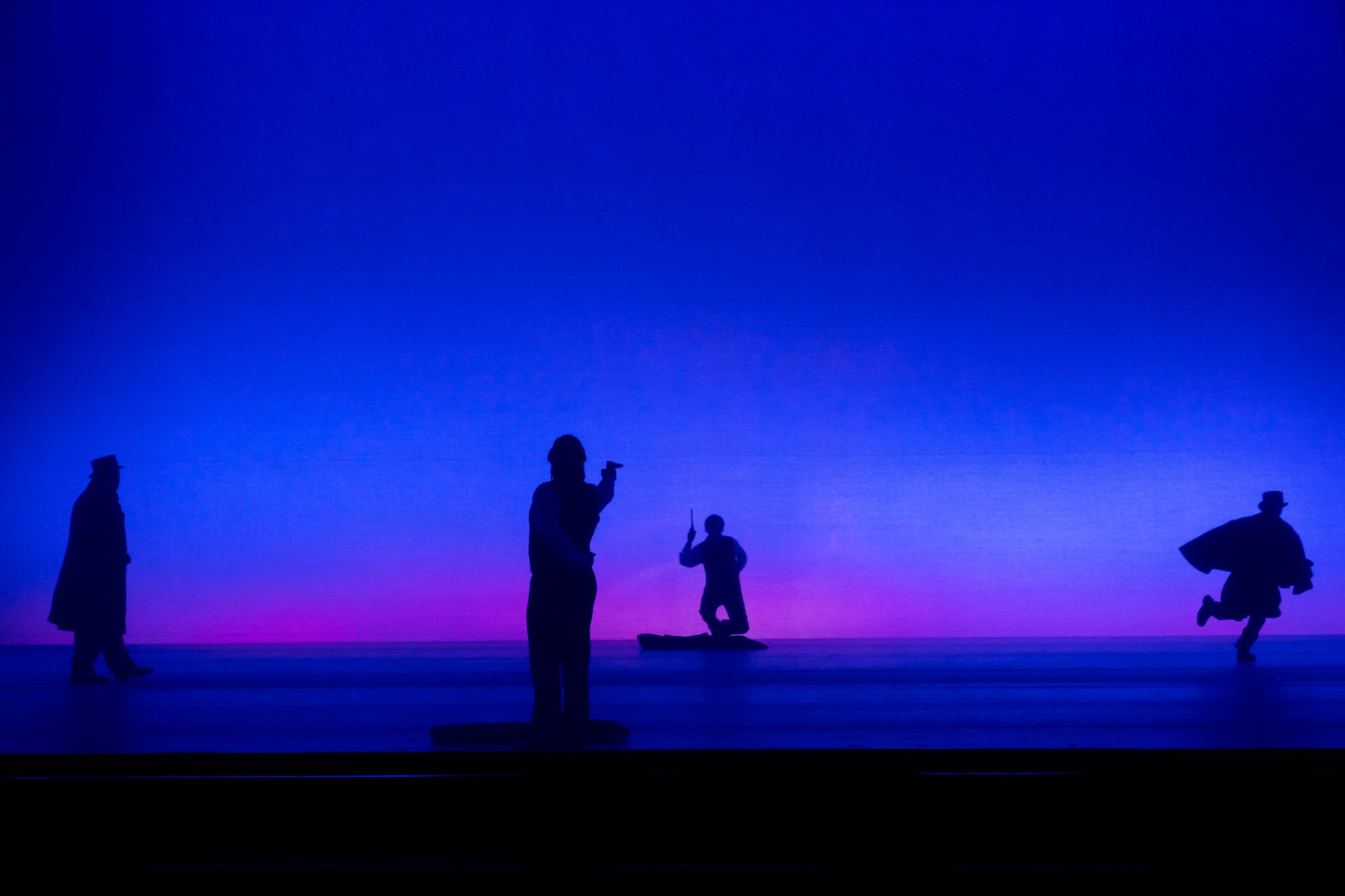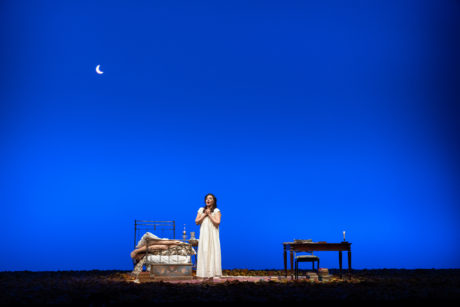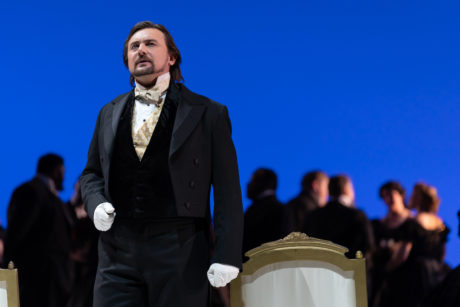Opening night in any form of theater is a big deal, but this Saturday’s opening of Eugene Onegin at Washington National Opera carries extra meaning at several levels.

It’s the first appearance in Washington’s flagship opera company of the opera based on Alexander Pushkin’s novel-in-verse in more than three decades, despite the high prominence of Russian art and music throughout Washington’s cultural presenting organizations. The eventual arrival of Onegin at the Kennedy Center was telegraphed by a memorable semi-staged presentation by the Washington-based Russian Chamber Art Society in the French Embassy’s concert hall in 2016. And the music is by Peter Ilyich Tchaikovsky, whose style, familiar from his ballets Swan Lake, Sleeping Beauty, and The Nutcracker, plus Fourth of July favorite The 1812 Overture, may be more ingrained in the American “ear” than any other classical composer.
But perhaps most importantly, Onegin cuts through a key discontinuity between musical theater and opera: the idea that you’re supposed to read the plot synopsis before an opera or you won’t understand it. In Eugene Onegin, that’s unnecessary once the four key characters are introduced about 15 minutes into the show. From there to the end, the plot is very straightforward and immediately comprehensible, even if the characters are psychologically complex.
The story’s main characters are almost but not quite like the “main” and “comic” couples that came to rule American musical theater for decades. Interestingly, first there’s not the title character, who is something of an antihero, but arguably the heroine of the story, Tatiana. She’s one of the daughters of the widowed owner of a country estate, and she falls madly and perhaps somewhat ridiculously in love with Eugene Onegin, who has inherited a neighboring estate from a recently deceased uncle. Besides being rich, Onegin is rather lazy and very easily bored, which has key implications for future conflict with the second couple.
That couple consists of Tatiana’s sister, Olga, who has the opposite of Tatiana’s bookish and daydreaming personality and prefers laughter and gaiety in the present moment, and her betrothed, another (and much more sensitive) young landowner named Lensky, who also strikes up a friendship with the newly arrived Onegin if for no other reason than proximity.

The first 15 minutes of the opera do bear some advance explanation because of their more subtle foreshadowing quality. The opera opens with Tatiana and Olga’s mother and nanny, neither of whom married for love nor were given the opportunity to do so, singing a mournful remembrance with the repeated refrain, “Heaven gives us habit in place of happiness.” This cautionary idea hangs over the younger protagonists from then till the finish line. It’s actually a happy time of year, with dozens of workers on the estate scurrying about bringing in the harvest, but they pointedly remark amid the jubilation on how hard they’ve had to work in the fields – a key contrast to the vain and idle Onegin who we have yet to meet.
But the opera really takes off later in Act 1 with the “Letter Scene,” a tour de force for the soprano singing Tatiana, who stays up all night writing a letter to Onegin confessing her love. That’s followed immediately by another of the most extraordinary scenes in opera, where Onegin rejects her with an extreme form of what in contemporary terms would be called the “It’s Not You, It’s Me” speech.
At an invited dress rehearsal on Tuesday evening in the Kennedy Center Opera House, the audience was so riled up by Onegin’s fine lecture that people all around me were muttering against him at intermission. I can’t speak for WNO management, but it seems to me if you want to bring a rotten tomato to throw over the orchestra pit and hit Onegin in the face right before intermission, they can’t complain, because you’ve bought a ticket! Besides, the reaction of the dress rehearsal audience meant that baritone Igor Golovatenko had hit his mark as Onegin in what is his American opera debut.
Now the stuffier sort of opera commentators, especially those who still look down on the critical innovation of English supertitles to translate the entire story in real time, are forever admonishing audiences that all the character hints they need are “in the music.” It’s a tricky business since it can be frustrating to read that you should catch a particular musical moment or two in a three-hour opera. But Tchaikovsky has one of these that’s so brilliant that it’s not only worth listening for but also gives you multiple opportunities, since it occurs many times with variations.
It’s a pair of related, downward-floating melodies that tend to start in a conventional major scale before turning sideways and either resolving back to a reasonably happy place or, alternatively, seeming to end up in an ash-heap. What’s fascinating is that these downward melodies are assigned not to either of the romantic couples but rather to one member of each – Tatiana and Lensky. They are, respectively, the far more sensitive member of each couple – Tatiana vs. the vain and heedless Onegin, and Lensky vs. the happy-go-lucky Olga. For good measure and ease of identification, Tchaikovsky also repeats these musical motives in a couple of the orchestral interludes introducing later scenes.

Listen for these melodies from the Letter Scene forward. It’s an extraordinary coup de theatre and, like a lot of things in opera, it’s up to you to say what exactly Tchaikovsky was suggesting about the nature of love and relationships by assigning them to two characters who were not romantically involved with each other. Also, don’t panic if you don’t hear any big, sweeping Tchaikovsky symphonic melodies in Act 1. They’re coming in later ball dance scenes, and you may even have a shock of recognition from the big polonaise from the opera.
As the heroine, Tatiana, Russian soprano Anna Nechaeva, in what is her American opera debut as well, really blooms later in the show when she hurls some very pointed questions at Onegin as to the timing of his own declaration of love. A true vocal star of the entire production is likely to be tenor Alexey Dolgov as Lensky, who was in beautiful voice at the invited dress and has also sung Lensky at the Metropolitan Opera and elsewhere.
Judging by the audience reaction at Tuesday’s rehearsal, among the minor characters a likely favorite will be American bass Eric Halfvarson in the role of Prince Gremin, a member of the St. Petersburg aristocracy who comes into play as the plot moves from country to city. It’s a tricky role that can defeat those who try to play it as a dirty old man (of which there are plenty in opera, but Tchaikovsky didn’t write it this way) or who alternatively make it too logically romantic.

Halfvarson was already in great voice in the rehearsal, with his bass easily projecting over the orchestra (remember, no body mikes in opera!) conducted by Robert Trevino. The Opera House orchestra by opening night will probably provide more “boom” to the tension at the end of the opera – Ms. Nachaeva and Mr. Golovatenko as the main protagonists likewise had no problem singing/arguing over the musicians – and a bit more sprightliness to early scenes with American mezzo/contralto Lindsay Ammann as the bubbly Olga, who was running ahead of the orchestra early in the dress rehearsal.
Native Russian speakers will devour the detailed work by RCAS founder and WNO Russian diction coach Vera Danchenko-Stern with the obviously mostly American-born chorus – as indeed will all audience members who recognize the extra in-character motivation that diction work naturally provides to anyone on stage. It should be a memorable run for a wide-ranging Washington audience whether they’re attending their 100th opera or their very first.
Eugene Onegin presented by Washington National Opera opens Saturday, March 9, 2019, in the Kennedy Center Opera House – 2700 F Street NW, in Washington, DC. For tickets, call (202) 467-4600 or go online.
Note: The opera is sung in Russian with English surtitles. Performances run through Friday, March 29; check the performance calendar carefully because WNO is running the opera in repertory opposite Faust by Charles Gounod.




